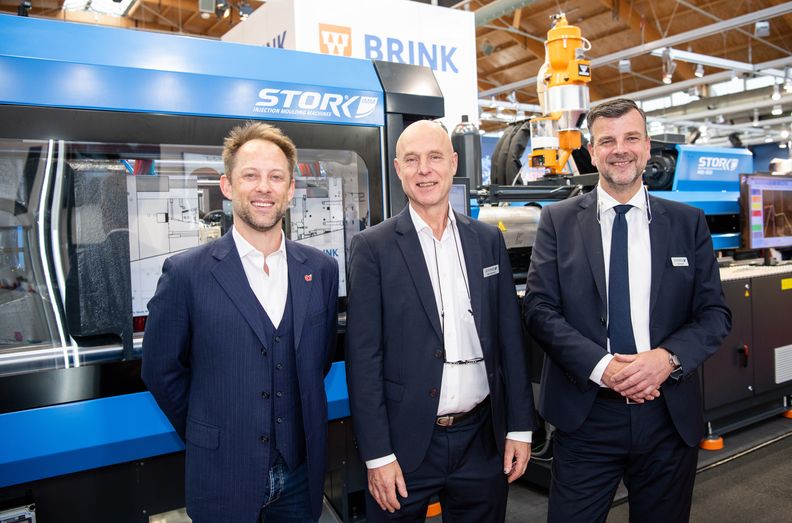Hengelo, Netherlands-based Stork Plastics Machinery BV has developed a breakthrough injection molding machine to process recycled PET in response to market demand and environmental concerns.
At Fakuma 2024, the hybrid press, called Foodline 4400, is producing an oval 1-liter container from 50 percent recycled PET in a custom two-cavity mold.
“This innovative container combines sustainability with complex geometry, offering a tamper-evident and watertight closure – a first in the packaging industry,” Stork IMM CEO Gert Boers said.
Boers described the container, which was developed by Brink Moulds & Automation, as the first high-quality, 1-liter PET container from half recycled content to be manufactured for high-volume production. “This is not just a development project. This is ready to go in a manufacturing environment,” he said. “We are setting a new benchmark for the future of packaging.”
Stork IMM and Brink officials have been to several trade shows where they said smaller bottles were produced with recycled content of 35 percent. They got to work to bring a more sustainable option to the food packaging market. “We took an important step. We topped it. We’re up to 50 percent rPET, which is a big achievement that reaffirms our commitment to deliver technology that will support a circular economy,” Boers said.
“This innovation aligns perfectly with the growing global focus on sustainability. As EU regulations now require a minimum percentage of post-consumer recycled content in packaging to avoid fines, our container is not only compliant but sets a new standard for what is possible with recycled materials in the food industry.”
Founded in 1968, Stork IMM specializes in rapid injection molding machines from 200 tons to 2,000 tons that make flowerpots, crates, food containers, buckets and lids.
In the European Union, regulations mandate the use of at least 35 percent post-consumer material in plastic packaging. Boers said this is a big challenge for food packaging manufacturers because of the inability to use recycled polypropylene due to European Food Safety Authority restrictions related to permeability.
While recycled PET has been used in blow molded PET bottles for years, the injection moldability has been an issue. Now, adjustments to the mold, material and machine have opened up a new alternative for the production of 1-liter buckets, Boers said.
For the material, Alpla developed a special additive that addresses the variability inherent in recycled materials and allows recycled PET to be injection molded with the same quality as virgin PET.
For the machine, Stork IMM based it on a previous platform but boosted the speed, acceleration and pressure to gear it specifically toward processing recycled PET for the food industry.
“This machine is capable of handling the high speeds and pressures required to produce thin-walled packaging,” Boers said. “It can reach injection pressures up to 3,000 bar, ensuring that the containers maintain the same wall thickness as those made from [polypropylene]. Moreover, Stork IMM’s machines are designed for continuous, high-speed production, meeting the demands of the packaging industry with 24/7 operational capacity.”
The 440-ton Foodline press on exhibit has been sold to Netherlands-based Kreuwel Plastics Almelo BV, which makes containers, pots, buckets, tubs and bins from recycled polypropylene and polyethylene.
Pressing developments
It took years of hard work, collaboration and development among Brink, Stork and Alpla to reach what they are calling a groundbreaking milestone in processing recycled PET.
With an optimized screw and valve geometry, continuous, high-speed production is possible, yielding cycle times of 6.2 seconds to produce 580 parts per hour.
For the recycled content, the Foodline 4400 press calculates the melt flow index (MFI) of the material while injecting in the same shot and adjusts for it with software developed by Brink called Stork Injection Control. The software detects changes in the MFI, corrects settings and maintains stability of the shot weights in the same cycle, which all reduces rejects, Stork IMM Sales Manager Wim Brinkman said.
“I think that is very important to point out that we compensate for the differences in melt flow by adjusting the injection parameters in the same shot,” Brinkman said. “This is not a closed loop with resetting of parameters after three or four shots. Every shot is 100 percent right no matter what material you throw in the machine, which is extremely important for everybody who starts using regrind material.”
Also, the clamp unit of the machine has a reinforced, redesigned movable platen to make it even more stiff for the high forces of packaging applications.
For the 1-liter container, the mold was custom designed for the unique properties of recycled PET, which meant adjusting the cooling, venting and injection systems to accommodate the forces generated during production.
Brink also has a versatile in-mold labeling system to apply labels for a visually appealing and functional product.
In the UK
Stork IMM officials are opening a new sales and service operation in the United Kingdom called Stork IMM UK to build on the company’s 20-plus-year history there, according to Benjamin Sutch, managing director of Chudleigh Sutch UK Ltd., Stork’s service and sales partner in the UK.
“We are seeing quite a bit of investment in the UK with people setting up and expanding their businesses to serve the local market,” Sutch said. “We think it’s the right time to add additional resources and expand the team to support our existing and new customers with service, sales and spare parts.”
With the establishment of domestic service, Boers said, “We’re now uniquely positioned to scale up and meet local needs while growing our business.”
The UK expansion comes on the heels of the opening of a US sales and service operation in Swedesboro, N.J. The USsubsidiary, called Stork IMM USA LLC, builds upon the company’s 25-year history in the North American market, Sutch said.
Source: sustainableplastics.com









